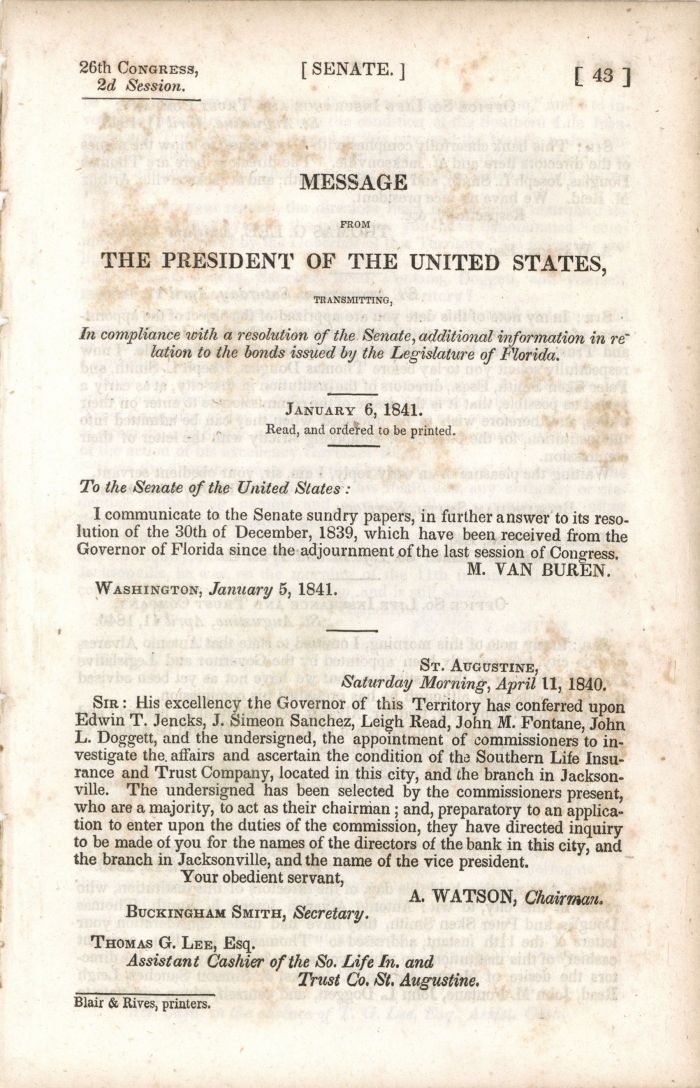M. Van Buren Message as President of the U.S. Not signed - Autographs
Inv# AU1666 Autograph
6 page "Message from The President of the United States" during M. Van Buren's presidency. Not signed.

Martin Van Buren (1782-1862) was born in the village of Kinderhook, NY, on December 5, 1782. He was the first president born a citizen of the United States, as all previous presidents were born before the American Revolution. He was also the only President who spoke English as a 2nd language.
Van Buren received a basic education at a dreary, poorly lit schoolhouse in his native village. His formal education ended before he reached 14, when he began studying law at the office of Francis Sylvester, a prominent Federalist attorney in Kinderhook. After six years under Sylvester, he spent a final year of apprenticeship in the New York City office of William P. Van Ness, a political lieutenant of Aaron Burr. Van Buren was admitted to the bar in 1803.
He married Hannah Hoes, his childhood sweetheart and distant relative on February 21, 1807, in Catskill, New York. The couple had five sons and one daughter. After 12 years of marriage, Hannah Van Buren contracted tuberculosis and died on February 5, 1819, at the age of 35. Martin Van Buren never remarried.
Van Buren had been active in politics from at least the age of 17 when he attended a party convention in Troy, New York where he worked to secure the Congressional nomination for John Van Ness. However, once established in his practice, he became wealthy enough to increase his focus on politics. He was an early supporter of Aaron Burr. He allied himself with the Clintonian faction of the Democratic-Republican Party, and was surrogate of Columbia County from 1808 until 1813, when he was removed. He joined the opposition party in 1813 and tried to find a way to oppose Clinton's plan for the Erie Canal in 1817.
In 1817 Van Buren's connection with so-called "machine politics" started. He created the first political machine encompassing all of New York, the Bucktails, whose leaders later became known as the Albany Regency. Van Buren did not originate the system, but gained the nickname of "Little Magician" for the skill with which he exploited it. He also served as a member of the state constitutional convention, where he opposed the grant of universal suffrage and tried to maintain property requirements for voting.
He was the prime architect of the first nationwide political party: the Jacksonian Democrats. In Van Buren's own words, "Without strong national political organizations, there would be nothing to moderate the prejudices between free and slaveholding states."
In February 1821, Martin Van Buren was elected a U.S. Senator from New York, defeating the incumbent Nathan Sanford who ran as the Clintonian candidate. On March 5, 1829, President Jackson appointed Van Buren Secretary of State, an office which probably had been assured to him before the election, and he resigned the governorship.
In April 1831, Van Buren resigned from his secretary of state position as a result of the Petticoat affair. Van Buren still played a part in the Kitchen Cabinet. In August 1831, he was appointed minister to the Court of St. James's (United Kingdom), and he arrived in London in September.
After a brief tour on through Europe, Van Buren reached New York on July 5, 1832. The 1832 Democratic National Convention, the party's first and held in May, had nominated him for vice-president on the Jackson ticket, despite the strong opposition to him which existed in many states. It took Van Buren and his partisan friends a decade and a half to form the Democratic Party.
In the election of 1832, the Jackson-Van Buren ticket won by a landslide. When the election of 1836 came up, Jackson was determined to make Van Buren, his personal choice, President to continue his legacy. Martin Van Buren's only competitors in the 1836 election were the Whigs. He was unanimously nominated by the 1835 Democratic National Convention at Baltimore. Van Buren's presidential victory represented a broader victory for Jackson and the party. Van Buren entered the White House as a 54 year old widower with 4 sons. A famous quotation of his is "As to my presidency the best two days of my life were those of my entrance upon the office and my surrender of it". He wanted to make a political party that united the plain republicans of the north and the planters of the south.









Ebay ID: labarre_galleries